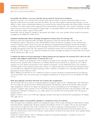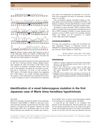 June 2023 in “GSC Advanced Research and Reviews”
June 2023 in “GSC Advanced Research and Reviews” Hutchinson-Gilford Progeria Syndrome causes rapid aging from a genetic mutation, with no cure but ongoing research into potential treatments.
 April 2023 in “Journal of Investigative Dermatology”
April 2023 in “Journal of Investigative Dermatology” The research found that a protein called PPARg is important for the formation and healing of sebaceous glands, which can regenerate independently from hair follicles.
 18 citations,
July 2010 in “Expert Review of Endocrinology & Metabolism”
18 citations,
July 2010 in “Expert Review of Endocrinology & Metabolism” The document concludes that PCOS has a strong genetic component, but more research is needed to fully understand the specific genes involved.
[object Object] 6 citations,
December 2013 in “Journal of Investigative Dermatology Symposium Proceedings” Alopecia areata involves complex immune and genetic factors, with potential treatment targets identified, but more research is needed.
 April 2023 in “Medizinische Genetik”
April 2023 in “Medizinische Genetik” New gene discoveries have improved diagnosis and treatment for skin and hair disorders, but more research is needed to fully understand them.
 30 citations,
June 2014 in “Seminars in Immunology”
30 citations,
June 2014 in “Seminars in Immunology” Future research on ectodysplasin should explore its role in diseases, stem cells, and evolution, and continue developing treatments for genetic disorders like hypohidrotic ectodermal dysplasia.
 2 citations,
October 2020 in “Annals of Oncology”
2 citations,
October 2020 in “Annals of Oncology” Men may be more vulnerable to severe COVID-19 due to genetic and hormonal factors, but more research is needed.
 1 citations,
September 2019 in “Practica medicală”
1 citations,
September 2019 in “Practica medicală” Hair loss is linked to heart disease and metabolic syndrome, and while current treatments vary in effectiveness, more research is needed for better solutions.
 July 2010 in “British Journal of Dermatology”
July 2010 in “British Journal of Dermatology” New hair regrowth model proposed, imiquimod found to kill skin cancer cells, T-cadherin loss linked to invasive skin cancer, no clear gene link to skin cancer after transplant, and study on children's hair loss shows male dominance and genetic ties.
 31 citations,
January 2010 in “GenomeBiology.com (London. Print)”
31 citations,
January 2010 in “GenomeBiology.com (London. Print)” The research concluded that selection significantly shaped the genetic variation of the X chromosome, with certain regions affected by past selective events.
 3 citations,
May 2018 in “InTech eBooks”
3 citations,
May 2018 in “InTech eBooks” Animal models, especially mice, are essential for advancing hair loss research and treatment.
 57 citations,
November 2017 in “Nature Communications”
57 citations,
November 2017 in “Nature Communications” Researchers found 71 genetic regions linked to male pattern baldness, which account for 38% of its genetic risk.
 14 citations,
April 2019 in “Genes”
14 citations,
April 2019 in “Genes” Researchers found a genetic region that influences the number of coat layers in dogs.
 November 2016 in “Hair transplant forum international”
November 2016 in “Hair transplant forum international” The conclusion is that more research is needed to understand if the drug finasteride causes Post-Finasteride Syndrome or if it's due to individual genetic makeup.
 86 citations,
December 2001 in “Experimental dermatology”
86 citations,
December 2001 in “Experimental dermatology” Mutant mice help researchers understand hair growth and related genetic factors.
 5 citations,
November 2022 in “Genetics selection evolution”
5 citations,
November 2022 in “Genetics selection evolution” Low-coverage sequencing is a cost-effective way to find genetic factors affecting rabbit wool traits.
5 citations,
May 2018 in “Therapeutic advances in drug safety” Androgen use may increase the risk of stroke, but more research is needed.
 1 citations,
October 2020 in “Journal of Investigative Dermatology Symposium Proceedings”
1 citations,
October 2020 in “Journal of Investigative Dermatology Symposium Proceedings” The summit concluded that new treatments like Jak inhibitors show promise for Alopecia Areata and personalized approaches are needed.
 August 2024 in “Archives of Dermatological Research”
August 2024 in “Archives of Dermatological Research” Certain genetic variants and pathways are linked to hair loss.
 12 citations,
February 2021 in “Translational Psychiatry”
12 citations,
February 2021 in “Translational Psychiatry” Researchers found two new genetic variants linked to Alzheimer's disease.
11 citations,
July 2021 in “Genetics selection evolution” Researchers found genes and genetic variants linked to sheep wool and skin wrinkles.
[object Object]  6 citations,
June 2016 in “Experimental Dermatology”
6 citations,
June 2016 in “Experimental Dermatology” Frontal Fibrosing Alopecia is a poorly understood condition that is hard to treat and causes distressing hair loss.
6 citations,
March 2014 in “Livestock science” Researchers created a genetic library from a cashmere goat's skin and found new genes linked to hair growth.
 6 citations,
January 2013 in “The Journal of Dermatology”
6 citations,
January 2013 in “The Journal of Dermatology” Researchers found a new genetic mutation causing a rare hair loss condition in the first Japanese child studied.
 February 2023 in “Sibirskij onkologičeskij žurnal”
February 2023 in “Sibirskij onkologičeskij žurnal” Chemotherapy often causes hair loss in cancer patients, affecting their mental health, but scalp cooling can help prevent it.
 August 2016 in “Journal of Investigative Dermatology”
August 2016 in “Journal of Investigative Dermatology” Researchers found a new genetic mutation linked to a hair condition in a Japanese boy.
 July 2019 in “Journal of Investigative Dermatology”
July 2019 in “Journal of Investigative Dermatology” The research found that male pattern hair loss is mostly genetic and involves hair thinning due to hormonal effects and changes in gene expression.
 May 2015 in “Journal of Dermatological Science”
May 2015 in “Journal of Dermatological Science” Researchers found a new area on chromosome 2 linked to a genetic hair loss condition.
January 2021 in “Przegla̧d dermatologiczny” Women know more about androgenetic alopecia than men.

PCOS has a strong genetic basis, but more research is needed to fully understand it.

























